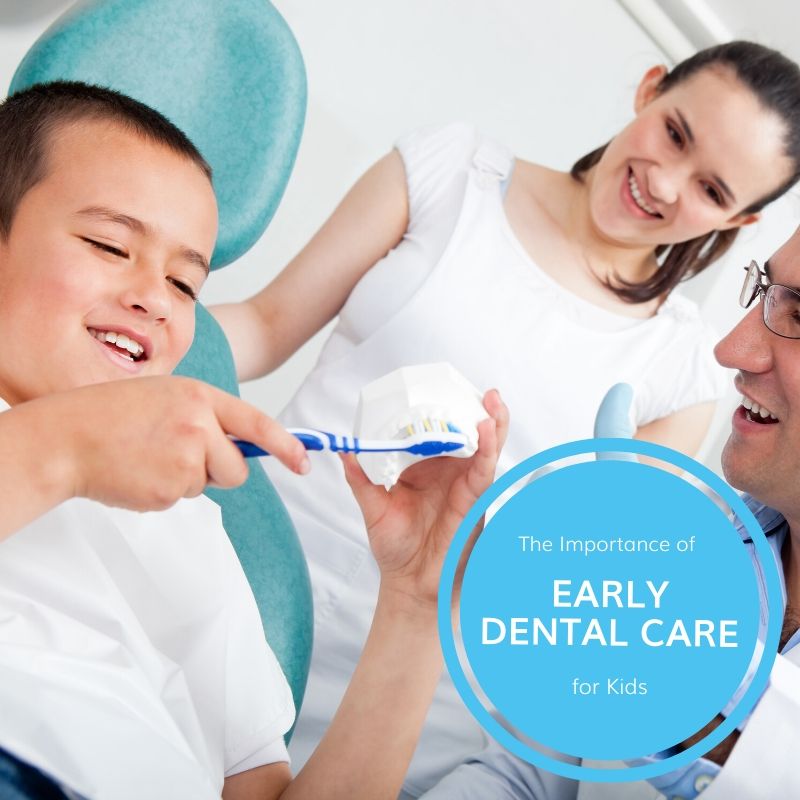Pediatric Dental Care

As a part of Pediatric Dental Care with regular check-ups and cleanings, we can ensure healthy and happy smiles. It is recommended for all patients to schedule a routine six-month check-up. We will screen your child’s mouth for tooth decay and gum disease. Regular professional dental cleanings are essential for a healthy mouth.
During your child’s dental cleaning, we will gently remove any buildup of plaque or tarter.
We may also recommend dental sealants for your child. Sealants protect against tooth decay and cavities on your child’s molars.
Molars are the most susceptible to cavities and least benefited by topical fluoride. Sealants are applied to the chewing surfaces of back teeth and are highly effective in preventing tooth decay. Fluoride may be applied to the teeth as well. Topical fluoride is used to strengthen enamel and make teeth more resistant to tooth decay.
Without proper dental care, children are susceptible to oral decay. Healthy smiles should not stop at our dental office. Our team will educate you and your child on how to make good food choices and how to properly brush and floss at home.

Your Baby’s First Dental Visit
We may also inform you about topics about your child’s overall oral health.
1. Teeth Development Stages
2. Typical harmful diets and important nutrition
3. Your Child oral habits and solutions
4. Cavity risk assessment
5. Exam all the cheeks and gums
6. Teething related solutions
Certain oral habits when performed repeatedly may cause changes in the facial structure and function of the jaws. Such habits need to be corrected. These include-
A. Thumb sucking or finger sucking
B. Mouth breathing
C. Nail biting
D. Tongue thrusting
E. Lip biting
Pediatric Dental Care ( Children’s Dental Care )
Oral care at home and office visits
At Gadkaris Dental Clinic, our dentist recommends every six-monthly recall visit. The six-month visit will help our dentist to understand and document your child’s oral growth and development. Continued care will provide us with proper preventive care for your child.
Why are baby teeth so important?
They are responsible for the overall general health of the body; they help the child achieve proper nutrition by participating in the first process of digestion. They help in speech development.
They boost the child’s self-esteem by making them smile confidently.
A child can pay better attention to studies and co-curricular activities if not in dental pain.
The cavity can happen even in the milk teeth, and infection in a young body, where the immunity is not developed.
Milk teeth preserve the space for permanent teeth. Permanent teeth follow the path of milk teeth when they are ready to erupt.
They help in the standard and proper development of facial muscles and bones.
Our team provides a caring and positive atmosphere for your child’s first dental visit. The primary visit goal is to develop a positive association with the dental office and our team, and this will establish trust between your child and the doctor.
The first visit is essential to learn more about the development process of your child’s oral health. During this first visit, we will provide a gentle exam and cleaning to make sure the teeth are in a healthy status. Our dentist will offer routine oral care for your child. Oral care includes a complete exam, teeth polishing, and fluoride application When mandated, x-rays for diagnosis.
Space maintainers
Space maintainers help “hold space” for permanent teeth. Your child may need one if he or she loses a baby tooth prematurely before the permanent tooth is ready to erupt. If a milk tooth is lost too early, the space for a permanent tooth under it may close.
As a result, the permanent tooth may get blocked or erupt in the wrong position leading to orthodontic problems. To prevent this from happening, the dentist may recommend a space maintainer to hold open the space left by the missing tooth.
Both milk teeth and permanent teeth can break due to falls while playing or other accidental injuries. Depending on the level at which the tooth is broken or if the entire tooth is knocked off, we provide different restorative options.
It is extremely essential to report to the clinic in case of a broken or knocked-off upper front tooth/teeth. Immediate care in such situations prevents long-term complications associated with trauma.
